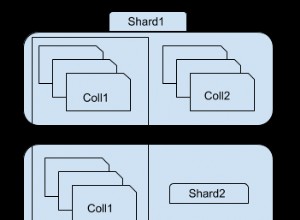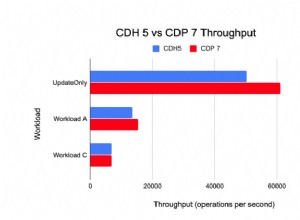Sie können die folgende Aggregationspipeline ausprobieren.
Beachten Sie mergeObjects
Aggregationsoperator ist in 3.5.6 + verfügbar Entwicklungsversion, die in das kommende 3.6 einfließen wird freigeben.
db.collection.find();
{
"data" : [
[
{
"movie" : "starwars",
"showday" : "monday"
},
{
"movie" : "batman",
"showday" : "thursday"
},
{
"movie" : "sleepless",
"showday" : "tuesday"
}
],
[
{
"actor" : "angelina",
"location" : "new york"
},
{
"actor" : "jamie",
"location" : "california"
},
{
"actor" : "mcavoy",
"location" : "arizona"
}
]
]
}
Aggregation mit bedingtem Ausdruck.
aggregate({
$project: {
cp: {
$reduce: {
input: "$data",
initialValue: {
$arrayElemAt: ["$data", 0] // Set the initial value to the first element of the arrays.
},
in: {
$let: {
vars: {
currentr: "$$this", // Current processing element
currenta: "$$value" // Current accumulated value
},
in: {
$cond: [{ // Conditional expression to return the accumulated value as initial value for first element
$eq: ["$$currentr", "$$currenta"]
},
"$$currenta",
{ // From second element onwards prepare the cartesian product
$reduce: {
input: {
$map: {
input: "$$currenta",
as: a"a",
in: {
$map: {
input: "$$currentr",
as: r"r",
in: {
$mergeObjects: ["$$a", "$$r"] // Merge accumulated value with the current processing element
}
}
}
}
},
initialValue: [],
in: {
$concatArrays: ["$$value", "$$this"] // Reduce the merged values which will be used as accumulator for next element
}
}
}]
}
}
}
}
}
}
});
Aggregation (mit $setUnion ).
Diese Lösung wurde nur hinzugefügt, um den bedingten Ausdruck zu unterdrücken, um eine besser lesbare Pipeline zu erhalten.
aggregate({
$project: {
cp: {
$reduce: {
input: "$data",
initialValue: {
$arrayElemAt: ["$data", 0] // Set the initial value to the first element of the arrays.
},
in: {
$let: {
vars: {
currentr: "$$this", // Current processing element
currenta: "$$value" // Current accumulated value
},
in:{
$reduce: {
input: {
$map: {
input: "$$currenta",
as: "a",
in: {
$map: {
input: "$$currentr",
as: "r",
in: {
$mergeObjects: ["$$a", "$$r"] // Merge accumulated value with the current processing element
}
}
}
}
},
initialValue: [],
in: {
$setUnion: ["$$value", "$$this"] // Reduce the merged values which will be used as accumulator for next element
}
}
}
}
}
}
}
}
});
Aktualisieren
Beide oben genannten Lösungen funktionieren nicht mit sich wiederholenden Werten über Arrays hinweg, wie in Asya Kamskys Kommentaren unten erwähnt, wegen des falschen $cond in der ersten Lösung und $setUnion in zweiter Lösung.
Die richtige Lösung ist
Beginnen Sie mit initialValue von [ { } ]
Oder
input ändern um das erste Element auszuschließen wie input: {$slice:["$data", 1, {$subtract:[{$size:"$data"},1]}]},
Komplette Aggregationspipeline
aggregate({
$project: {
cp: {
$reduce: {
input: {$slice:["$data", 1, {$subtract:[{$size:"$data"},1]}]},
initialValue: {$arrayElemAt:["$data",0]},
in: {
$let: {
vars: {
currentr: "$$this",
currenta: "$$value"
},
in:{
$reduce: {
input: {
$map: {
input: "$$currenta",
as: "a",
in: {
$map: {
input: "$$currentr",
as: "r",
in: {
$mergeObjects: ["$$a", "$$r"]
}
}
}
}
},
initialValue: [],
in: {
$concatArrays: ["$$value", "$$this"]
}
}
}
}
}
}
}
}
});
Referenz:Kartesisches Produkt mehrerer Arrays in JavaScript




